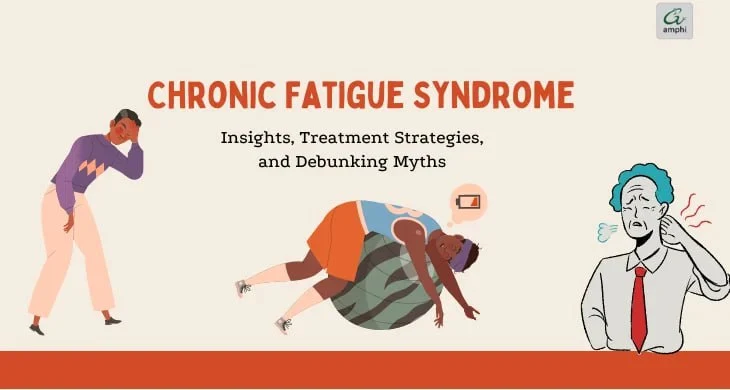Welcome to our comprehensive guide of Chronic Fatigue Syndrome(CFS), a multifaceted disease affecting millions of people worldwide. In this composition, we look at the nuances of CFS including its symptoms challenges in finding out the condition, available treatments and the significance of eliminating myths around it. Join in as we unveil the puzzle behind CFS and offer intimate details, remedial approaches, and a better understanding of this frequently misperceived illness.
Understanding Chronic Fatigue Syndrome
Chronic Fatigue Syndrome (CFS) is a harsh illness that affects people across the Globe. It’s defined as a constant frazzle that cannot get better with rest. People often struggle with headaches, altered sleep habits, pain in their muscles and joints, and cognitive memory loss in addition to prostration. Though the exact causes of CFS are still unknown despite a great deal of exploration, viral infections, hormonal changes, and cerebral stress are believed to be important factors in the illness’s development. The complexity of CFS is cleared by multiple character, which makes diagnosis and treatment procedures delicate. Understanding and treatment are made more delicate by the fact that affected people present with different symptoms. Healthcare providers concentrate on symptom relief and enhancing patients’ quality of life while experimenters continue to investigate the root cause of CFS. By addressing both physical and cerebral aspects of the condition, healthcare providers aim to offer comprehensive support to people scuffling with CFS. Despite the challenges posed by this enigmatic condition, ongoing efforts to raise awareness, debunk misconceptions and develop effective treatment strategies offer the possibility of better results and enhanced well-being for those living with CFS.
Signs and Symptoms of CFS
The symptoms of Chronic Fatigue Syndrome (CFS) embrace knowing fatigue persevering for at least six months, accompanied by cognitive difficulties, unrefreshing sleep and physical discomforts similar as muscle pains and headaches. These manifestations collectively impose substantial burdens on daily activities and overall well-being. The persistent fatigue defies conventional remedies leaving individuals grappling with diminished cognitive function and disrupted sleep patterns. Moreover, the presence of physical symptoms like muscle pain and headaches compounds the challenges making routine tasks arduous and detracting from life. This intricate interplay of symptoms underscores the complex nature of CFS and the urgent need for tailored interventions to address the multifaceted impact on individuals’ lives.
Diagnosis and Treatment
Diagnosing Chronic Fatigue Syndrome( CFS) presents an intimidating challenge, requiring careful medical history assessments and the rejection of indispensable causes. Physicians navigate through a warren of symptoms, often overlaying with other conditions to arrive at an accurate diagnosis. Once identified, treatment initially revolves around easing symptoms and enhancing holistic well-being. This multifaceted approach entails a mix of pharmacological interventions, life changes and therapeutic interventions acclimatized to individual conditions. Medications target specific symptoms like pain and sleep disturbances, while life adaptations encompass pacing conditioning and conserving energy levels. Also, remedies encompassing cognitive-behavioral ways offer inestimable support in managing the cerebral risk of the condition. By addressing the different array of symptoms and their mechanisms, healthcare professionals strive to enhance the quality of life for individualities scuffling with the complex abstracts of CFS.
Living with CFS: Treatment Strategies
The control of Chronic Fatigue Syndrome (CFS) demands a comprehensive strategy that encompasses various confines of care. This multifaceted approach incorporates pharmacological interventions aimed at easing symptoms similar as pain and sleep disturbances. Similarly important is the practice of pacing conditioning to conserve energy in situations and help with the exacerbation of symptoms. Incorporating gentle exercises into bone routine can contribute to maintaining physical function and overall well-being. Adopting a healthy life, including nutritional eating habits and acceptable hydration, complements these efforts. Also, seeking guidance and support from healthcare professionals specialized in CFS operations, as well as engaging with support groups, can give inestimable support in navigating the challenges posed by the condition. By integrating these factors into a cohesive treatment plan, individuals with CFS can optimize their treatment approach and enhance their quality of life.
Misconceptions About CFS
It’s imperative to dispel misconceptions girding Chronic Fatigue Syndrome( CFS) to alleviate stigma and foster appreciation. Despite prevailing beliefs, CFS isn’t attributable to shiftlessness or a deficiency in provocation; rather, it’s a multifaceted medical condition characterized by natural irregularities. These misconceptions contribute to misconstructions and hamper support for individuals scuffling with CFS. By challenging these myths, we can cultivate a further compassionate and informed perspective on the condition. Recognizing CFS as a licit medical concern underscores the significance of exploration, advocacy, and support networks devoted to addressing its complications. Through education and advocacy efforts, we can promote lesser awareness and acceptance, paving the way for enhanced support systems and better results for those affected by CFS.
Conclusion
Chronic Fatigue Syndrome is a complex condition with weakening effects on individuals’ lives. By understanding its nature, disbanding misconceptions, and espousing effective treatment strategies, individuals with CFS can enhance their quality of life and get back control over their health. It’s critical to foster empathy and support for those living with CFS to produce more inclusive and empathic environment.
FAQs
Ques. Can habitual Fatigue Syndrome be cured?
Ans. Chronic Fatigue Syndrome can not be cured, but symptoms can be maneuvered effectively with proper treatment and life adaptations.
Ques. Is Chronic Fatigue Syndrome the same as normal frazzle?
Ans. No, Chronic Fatigue Syndrome goes beyond normal frazzle and is characterized by inviting fatigue that does not ameliorate with rest.
Ques. Is Chronic Fatigue Syndrome purely cerebral?
Ans. No, expansive exploration indicates natural abnormalities in individualities with habitual Fatigue Pattern, disconfirming the notion that it’s solely cerebral.
Ques. Is Chronic Fatigue Syndrome a cerebral condition?
Ans. No, CFS isn’t a cerebral condition. It’s a complex medical condition with natural abnormalities.
Ques. What causes Chronic Fatigue Syndrome?
Ans. The exact cause of CFS is unclear, but factors similar as viral infections, hormonal imbalances, vulnerable system dysfunction and cerebral stressors are believed to contribute.

